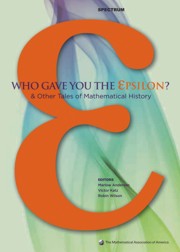Book contents
- Frontmatter
- Introduction
- Contents
- Analysis
- Geometry, Topology and Foundations
- Algebra and Number Theory
- Foreword
- Hamilton's Discovery of Quaternions
- Hamilton, Rodrigues, and the Quaternion Scandal
- Building an International Reputation: The Case of J. J. Sylvester (1814–1897)
- The Foundation Period in the History of Group Theory
- The Evolution of Group Theory: A Brief Survey
- The Search for Finite Simple Groups
- Genius and Biographers: The Fictionalization of Evariste Galois
- Hermann Grassmann and the Creation of Linear Algebra
- The Roots of Commutative Algebra in Algebraic Number Theory
- Eisenstein's Misunderstood Geometric Proof of the Quadratic Reciprocity Theorem
- Waring's Problem
- A History of the Prime Number Theorem
- A Hundred Years of Prime Numbers
- The Indian Mathematician Ramanujan
- Emmy Noether
- “ Marvelous Proof,”
- Afterword
- Surveys
- Index
- About the Editors
Foreword
from Algebra and Number Theory
- Frontmatter
- Introduction
- Contents
- Analysis
- Geometry, Topology and Foundations
- Algebra and Number Theory
- Foreword
- Hamilton's Discovery of Quaternions
- Hamilton, Rodrigues, and the Quaternion Scandal
- Building an International Reputation: The Case of J. J. Sylvester (1814–1897)
- The Foundation Period in the History of Group Theory
- The Evolution of Group Theory: A Brief Survey
- The Search for Finite Simple Groups
- Genius and Biographers: The Fictionalization of Evariste Galois
- Hermann Grassmann and the Creation of Linear Algebra
- The Roots of Commutative Algebra in Algebraic Number Theory
- Eisenstein's Misunderstood Geometric Proof of the Quadratic Reciprocity Theorem
- Waring's Problem
- A History of the Prime Number Theorem
- A Hundred Years of Prime Numbers
- The Indian Mathematician Ramanujan
- Emmy Noether
- “ Marvelous Proof,”
- Afterword
- Surveys
- Index
- About the Editors
Summary
Algebra in 1800 meant the solving of equations. By 1900, the term was beginning to encompass the study of various mathematical structures—sets of elements with well-defined operations, satisfying certain specified axioms—and by the 1930s, under the influence of Emmy Noether, this change was complete. This chapter explores some aspects of this change in the notion of algebra over that time period.
The nineteenth century also saw a change in number theory, not so much in the subject matter but in the methods of proof. From the inception of number theory, one proved results about positive integers by using positive integers. But in the nineteenth century, mathematicians generalized their results by beginning to look at other “numbers”, beginning with the Gaussian integers. Then, in a more striking change, they began to consider proofs about numbers using techniques from real and complex analysis. Several articles in this chapter explore these changes.
The first two articles in this chapter discuss aspects of the history of quaternions, the first algebraic system to be studied that did not satisfy the commutative law. B. L. van der Waerden tells the story of Hamilton's discovery of the quaternions, beginning with his search for a law of multiplication for triples (or vectors in three-dimensional space) that would generalize the law of multiplication for complex numbers, thought of as pairs or as vectors in two-dimensional space. Simon Altmann then continues the story, showing how over many years Hamilton attempted to interpret his quaternions in terms of rotations in space. Ultimately, Hamilton failed in this attempt, and the reasons were only elucidated by Olinde Rodrigues, a French banker whose contributions to mathematics are little known.
- Type
- Chapter
- Information
- Who Gave You the Epsilon?And Other Tales of Mathematical History, pp. 197 - 199Publisher: Mathematical Association of AmericaPrint publication year: 2009



